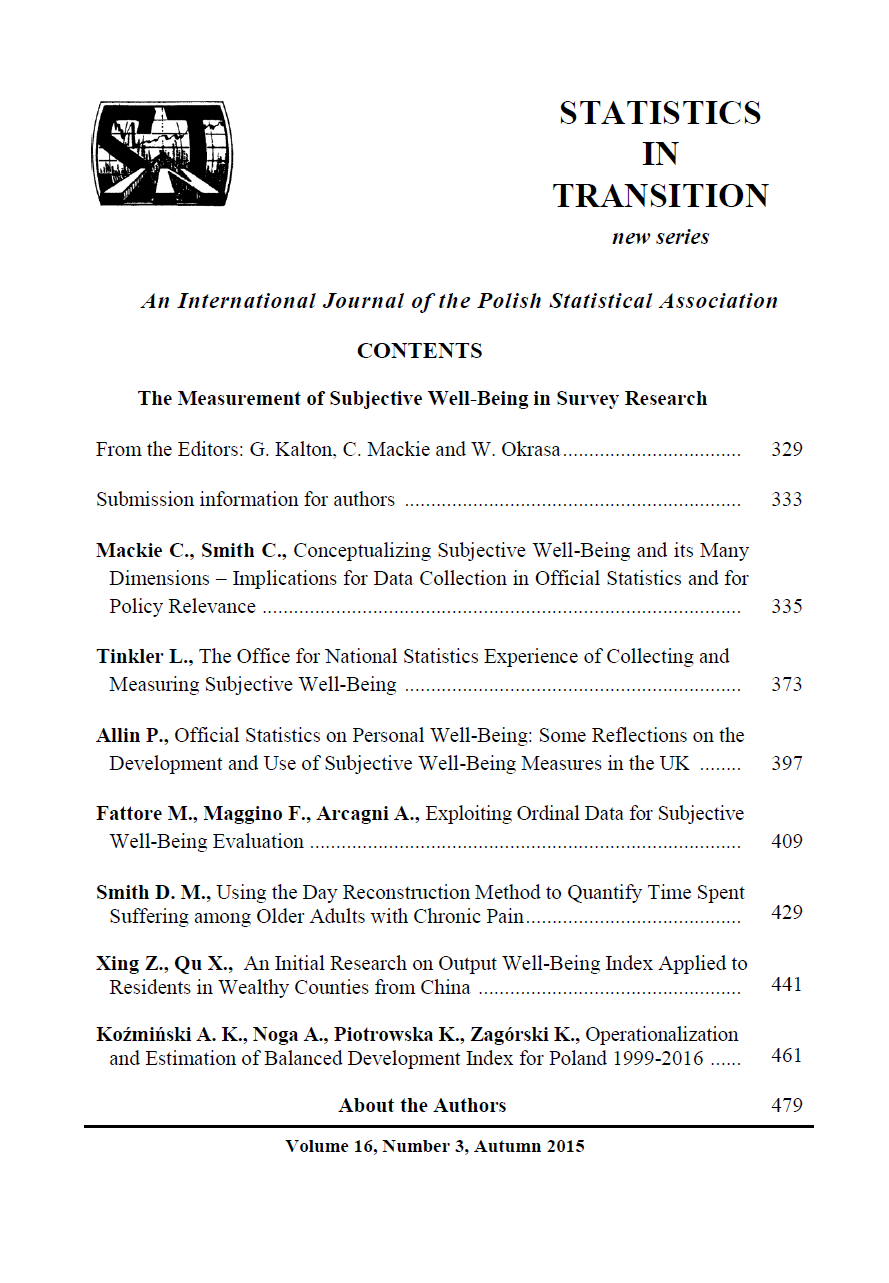ARTICLE
ABSTRACT
This paper draws on experience of the UK Office for National Statistics (ONS) programme to measure national well-being, particularly the high-profile element of the programme in which subjective well-being measures have been collected and published since April 2011. We reflect on drivers of the ONS work and on how these have given rise to interest both in national well-being – the Beyond GDP agenda – and in the use of subjective well-being measures (self-reported, personal well-being) in public policy. Although we touch briefly on measurement and analysis issues, we mainly concentrate on user requirements, the international context, and political, policy, public and business use of well-being data
KEYWORDS
beyond GDP, measuring national well-being, subjective well-being, user requirements, well-being and policy, cost-benefit analysis.
REFERENCES
ALLIN, P., (2007). Measuring societal wellbeing. Economic & Labour Market Review. Office for National Statistics. Vol. 1(10), 46-52.
ALLIN, P., HAND, D. J., (2014). The Wellbeing of Nations: Meaning, motive and measurement. John Wiley & Sons, Ltd., Chichester.
ALLIN, P., HAND, D. J., (forthcoming) New Statistics for Old? - Measuring the Wellbeing of the UK, submitted to Journal of the Royal Statistical Society (Series A).
APPGWE, (2014). Wellbeing in four policy areas. Report by the All-Party Parliamentary Group on Wellbeing Economics at http://b.3cdn.net/nefoundation/ccdf9782b6d8700f7c_lcm6i2ed7.pdf
downloaded 13 January 2015.
BERGER, J., (2013). Understanding a Photograph, Penguin Books, London.
BOARINI, R., JOHANSSON, A., D’ERCOLE, M. M., (2006). Alternative Measures of Well-Being. OECD Social, Employment and Migration Working Paper DELSA/ELSA/WD/SEM(2006)2, OECD, Paris.
CAMERON, D., (2010). PM’s speech on wellbeing at https://www.gov.uk/government/speeches/pm-speech-on-wellbeing downloaded 7 January 2015.
COMMISSION OF THE EUROPEAN COMMUNITIES, (2009).Communication from the Commission to the Council and the European Parliament: GDP and beyond, Measuring progress in a changing world. COM(2009) 433 final, CEC, Brussels.
DOLAN, P., (2014). Happiness by Design. Penguin Books, UK.
FUJIWARA, D., KUDRNA, L., DOLAN, P., (2014). Quantifying and Valuing the Wellbeing Impacts of Culture and Sport, at https://www.gov.uk/government/uploads/system/uploads/attachment_data/file/304899/Quantifying_and_valuing_the_wellbeing_impacts_of_sport_and_culture.pdf downloaded 13 January 2015.
HM TREASURY, (2010). Budget 2010 (HC61), The Stationery Office, London.
JOHNS, H., ORMEROD, P., (2007). Happiness, Economics and Public Policy. The Institute of Economic Affairs, London.
LAYARD, R., (2005). Happiness: Lessons from a New Science. Penguin Books, London.
MOSER, C., (2000). Foreword in Social Trends 30, Office for National Statistics, London.
ONS, (2011). Measuring National Well-being: A discussion paper on domains and measures at http://www.ons.gov.uk/ons/rel/wellbeing/measuring-national well-being/discussion-paper-on-domains-and-measures/measuring-national well-being---discussion-paper-on-domains-and-measures.html#tab Introduction downloaded on 2 February 2015.
O’BRIEN, D., (2010). Measuring the value of culture: a report to the Department for Culture Media and Sport, at https://www.gov.uk/government/uploads/system/uploads/attachment_data/file/77933/measuring-the-value-culture-report.pdf downloaded 13 January 2015.
O’DONNELL, G., (2010). Introduction to Wellbeing Conference, 25 November 2010, HM Government.
O’DONNELL, G., DEATON, A., DURAND, M., HALPERN, D., LAYARD, R.,(2014). Wellbeing and Policy. Report commissioned by the Legatum Institute, London.
STIGLITZ, J. E., SEN, S., FITOUSSI, J-P., (2010). Mismeasuring our lives: why GDP doesn’t add up. The New Press, New York.
TINKLER, L., (2015). The Office for National Statistics Experience of Collecting and Measuring Subjective Well-Being, Statistics in Transition – new series,Vol. 16, No. 3, pp. 373-396
